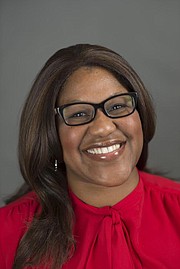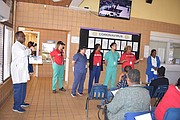By FELICITY DARVILLE
Dr Shanika Hill is happy that she got to fulfil her mission to come to The Bahamas and help hundreds of diabetic patients before the Covid-19 pandemic, which has now changed the face of healthcare in the world. Earlier this month, Shanika led a team of 14 healthcare professionals and students from Miami to Nassau to take part in a special campaign to help decrease the amount of local diabetic patients undergoing amputations.
LEAP – Lower Extremity Amputation Prevention programmes occur around the world, led by organisations like the US Health Resources and Services Administration, with the singular goal of decreasing the amputations of people worldwide. For Dr Hill, it was an honour to organise fellow podiatrists, professional nurses, physician assistants and podiatric students to travel to The Bahamas to help save limbs.
Dr Daniel Johnson introduced LEAP to The Bahamas along with well-known American podiatrist Dr Joe Fox back in 1998. It was the fulfilment of a promise Danny had made to his mother, Sylvia and her friends, when he was still studying medicine.
He was studying at the London Foot Hospital where there was a special unit to deal with amputations of soldiers coming from war zones. For a time, Danny had served for the British Army as a medic in North Africa. He learned that many soldiers were not eating properly when they returned home from the war and as a result, many of them developed Type 2 Diabetes and were having to have limbs amputated.
When he came home to The Bahamas, his mother and her friends pointed out that many Bahamians were suffering the same fate. He made a promise that he fulfilled when he started LEAP in The Bahamas; a programme that continues today and extends when people like Dr Shanika Hill take part.
As president of the Bahamas Podiatric Medical Association (BPMA), Dr Johnson wanted to take LEAP to the next level. A part of that goal included inviting Dr Victor Horsley from Belleville, Illinois to come to The Bahamas to assist. In this latest phase Dr Hill and her team came for a week-long clinic. She is close friends with podiatrist Dr Monique Mitchell, and she made a call to Monique after Hurricane Dorian to see how she could help people using her skills as a podiatrist.
The team of 14 Americans worked with the BPMA to host clinics around New Providence, including at South Beach, Elizabeth Estates, Flamingo Gardens and Fleming Street Clinics, as well as at Foot & Ankle International, Fort Charlotte and Grosvenor Close. During that time, nearly 700 Bahamians desperate to avoid having a limb amputated were seen.
In The Bahamas, more than half of the diabetics who have an amputation end up dying in five years or less. Because of this startling statistic, there has been a push to save not only the limbs, but the lives of diabetics. That’s exactly what Shanika set out to do when she became a podiatrist. She graduated from Barry University in 2006, then went on to Graduate Hospital Residency and Penn-Presbyterian Residency Programmes in Philadelphia, Pennsylvania. She did a Fellowship at the University of Pennsylvania, and residency at Bryn Mawr Hospital. She then returned to Barry University Adrian Dominican School of Education, where she received her doctorate in Education. She went in to private practice for a number of years.
Today, she is the Associate Dean of Clinical Education at Barry University’s School of Podiatric Medicine, which is one of only nine such schools in the United States of America. She is also an assistant professor for the school. She also serves as podiatrist at the Jesse Trice Community Health Centre in Miami-Dade. Barry, being a Catholic school, supported all of her efforts to provide service to low income communities.
“One of my main goals in life is to do medicine that gives back to the community… to low income, no income… people from minority communities who need podiatric care and cannot afford it,” she said.
Shanika was born and raised in Miami. She spent her childhood days on North Miami Beach, and she attended high school in South Miami, at G Holmes Braddock Senior High School.
“I went to church right around the corner from the community centre, so the patient population there are people I grew up with… family, friends, church folk… it was natural for them to come and see me and for me to take care of them,” she said.
It’s important, she explained, for people to have an opportunity to be given medical treatment from health care workers who are from the same background as they are. Shanika said she understands how they think, the way they live, the things they eat… things that ultimately affect their health status. She can provide them with the information they need in a way they can relate to in order to save their lives.
After witnessing the devastation of Hurricane Dorian on television, Shanika called up her friend and fellow graduate Dr Monique Mitchell to see how she could help victims who may have foot problems. Monique arranged for her friend to initially come to Nassau to meet with the BPMA and with the Chief Medical Officer at the Ministry of Health. On February 29 Shanika returned with a team of professionals on a mission to help as many Bahamians as they can in a one-week time period.
The team conducted blood glucose and blood sugar screenings, brought a Diabetic nurse to help them with ‘what to do next’, if they tested positive for Diabetes. The team conducted procedures for ingrown toenails, heel pain, removal of dead tissue that was preventing wound healing, and everything that ‘ran the gamut’ of podiatric care. There were some bedside operations that occurred, and in some cases, diabetics had wounds that were so far gone, they had to be recommended for amputations in order to save their lives.
“Some patients did have to be forwarded to an emergency setting because of the lack of care they had before we got there,” the veteran podiatrist shared, adding: “Some of the patients did not understand the gravity of the situation and that their wound had become septic.”
“It boggles my mind that there are only five podiatrists in the Bahamas,” Shanika told me after her trip to the clinics and to the remaining shelters where hurricane victims are still being housed.
For this reason, she hopes to come again with a team to visit Grand Bahama, noting she ‘cannot imagine’ how bad the situation may be on the Family Islands. The Bahamas has such a high rate of Diabetes, that issues like wounds can become deadly ones. She believes the BPMA can achieve its goal and that by reaching out to partners like her, there is a chance to save more Bahamian diabetics.
“To be able to go into the Bahamian community reminded me of home,” she said.
“Some of the areas remind me of Miami – they are surrounded by water. The Bahamian people are so gracious and appreciative. Some of them waited for hours for our care. When I see them I would tell them I am so sorry for the wait. They would tell me, ‘No problem, we came here for you!’ Everyone was so nice. They hugged me, they blessed me. I can’t say enough about how gracious and polite the Bahamian people are.”
Shanika also held a donation drive in Miami before she came to Nassau. She was able to accrue medical supplies and hygiene items that she and her team donated to the shelters. In addition, through the Save a Limb Save a Life project, she got 500 pairs of Diabetic shoes that she left for Bahamians who need them.
For more information, visit www.footandankleinternational.com, or email getresults@footandankleinternational.com.







Comments
Use the comment form below to begin a discussion about this content.
Sign in to comment
Or login with:
OpenID